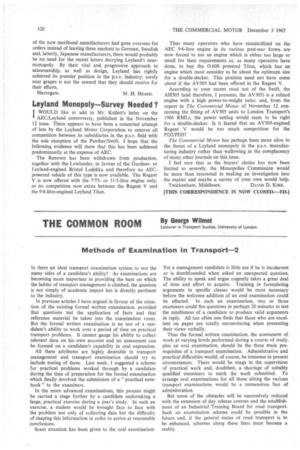Methods of Examination in Transport-2
Page 122

If you've noticed an error in this article please click here to report it so we can fix it.
Is there an ideal transport examination system to test the many sides of a candidate's ability? As examinations are becoming more important in providing the base on which the ladder of transport management is climbed, the question is not simply of academic import but is directly pertinent to the industry. In previous articles I have argued in favour of the retention of the existing formal written examination, provided that questions test the application of facts and that reference material be taken into the examination room. But the formal written examination is no test of a candidate's ability to work over a period of time on practical transport problems. It cannot gauge his ability to collect relevant data on his own account and no assessment can be formed on a candidate's capability in oral expression. All these attributes are highly desirable in transport management and transport examination should try to include testing of these. Last week, I suggested a scheme for practical problems worked through by a candidate during the time of preparation for the formal examination which finally involved the submission of a "practical notebook" to the examiners. In the more advanced examinations, this process might be carried a stage further by a candidate undertaking a large, practical exercise. during a year's study. In such an exercise, a student would be brought face to face with the problem not only of collecting data but the difficulty of shaping this information in order to arrive at reasonable conclusions. Scant attention has been given to the oral examination. Yet a management candidate is little use if he is incoherent or is dumbfounded when asked an unexpected question. The ability to speak and argue cogently takes a great deal of time and effort to acquire. . Training in formulating arguments in specific classes would be most _necessary before the welcome addition of an oral examination could be effected. In such an examination, two or three examiners could fire questions in perhaps 20 minutes to test the nimbleness of a candidate to produce valid arguments in reply. All too often one finds that those who are excellent on paper are totally unconvincing when presenting their views verbally. Thus the formal written examination, the assessment of work at varying levels performed during a course of study, plus an oral examination, should be the three main prerequisites of a transport examination. Administrative and practical difficulties would, of course, be immense in present circumstances. There would be snags in the supervision of practical work and, doubtless, a shortage of suitably qualified examiners to mark the work submitted. To arrange oral examinations for all those sitting the various transport examinations would be a tremendous feat of administration. But some of the obstacles will be successively reduced with the extension of day release courses and the establishment of an Industrial Training Board for road transport. Such an examination scheme could be possible in the future and, if the general status of road transport is to be enhanced, schemes along these lines must become a reality.
















































































































































































